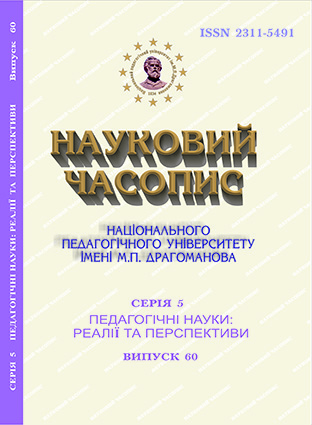REGULARITIES AND PRINCIPLES OF THE EDUCATION BILINGVAL CULTURE FOR FUTURE TEACHERS OF FOREIGN LANGUAGE
Ключові слова:
bicultural, bilingualism, bilingual communication, bilingual communication culture, future teachers of foreign language educationАнотація
The article reveals the actual problem of modern pedagogical education professional training and education of bilingual culture in future teachers of a foreign language. New conditions for the development of modern society strongly dictate the need for training specialists with a high level of bilingual culture, able to solve complex issues of intercultural interaction, capable of rapid social adaptation and cultural integration in a constantly changing, increasingly interconnected world, increasing global problems and crises.
The regularities and principles laid down in the organizational and methodological system of education of the future teacher-philologist are grounded: the principle of humanistic personality development in the process of foreign language education, the principle of continuity, the principle of interdisciplinary humanitarization and integration, the principle of dialogue of cultures, the principle of pedagogical support of socio-cultural adaptation of the individual in a constantly changing multicultural world.
The following are determined by the laws of professional education of the future teacher of a foreign language: active, productive personal-significant educational and cognitive activity in mastering a foreign language based on the relations of humanity, cooperation, partnership; a comprehensive account of the personal component and the subordination of all elements of the education and upbringing system to personality-forming, personally developing processes.
Посилання
Атрощенко Т. О. Розвиток культури міжнаціонального спілкування у студентському колективі / Т. О. Атрощенко // Наукові записки Тернопільського державного педагогічного університету. Серія: Педагогіка. – Тернопіль, 1999. – № 6. – С. 92–95.
Бахтин М. М. Эстетика словесного творчества [Текст] / М. М. Бахтин. – Москва : Искусство, 1979. – 423 с.
Библер В. С. Культура. Диалог культур (Опыт определения) [Текст] / В. С. Библер // Вопросы философии. – 1989. – № 6. – С. 31–42.
Каган М. С. Мир общения: Проблема межсубъектных отношений. [Текст] / М. С. Каган. – Москва : Политиздат, 1988. – 319 с.
Махінов В. М. Становлення мовної особистості в історії розвитку европейського соціокультурного освітнього простору: Монографія / Вид-во НПУ імені М. П. Драгоманова, 2012. – 428 с.
Окуневич Т. Г. Культура мовлення майбутнього вчителя-словесника в умовах українсько-російської двомовності: автореф. дис. … кандидата пед. наук: спец. 13.00.02. «Теорія та методика навчання (українська мова)» / Т. Г. Окуневич. – Херсон, 2003. – 26 с.
Сластенин В. А. Педагогика: учеб. пособ. для студ. высш. пед. учеб. завед. / В. А. Сластенин. – Москва : Издательский центр «Академия», 2002. – 576 с.
Сафонова В. В. Изучение языков международного общения в контексте диалога культур и цивилизаций. [Текст] / В. В. Сафонова. – Воронеж: Истоки, 1996. – 237 с.
Ягупов В. В. Педагогіка : навч. посіб. / В. В. Ягупов. – Київ : Либідь, 2002. – 560 с.
Brooks N. The Analysis of Language and Familiar Cultures / N. Brooks // The Cultural Revolution in Foreign Language Teaching: A Guide for Building the Modem Curriculum. – Skokie, Illinois : National Textbook Company, 1975. – Р. 12–31.
Goodenough W. H. Cultural anthropology and linguistics // Hymes D. (ed) Language in culture and society: A reader in linguistics and anthropology. – New York : Harper & Row, 1964. – p. 36–39.


